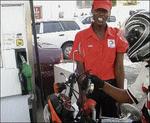
Photo by Mark Beckford
More women now work the pumps as men do not find the job attractive.
Mark Beckford, Staff reporter
Smartly attired in the signature colours of the parent company for which they work, they are constantly in motion - pumping gas, wiping windscreens, checking oil and transmission, and batteries or peering beneath the hoods of vehicles.
They are women working the pumps, doing what you were probably accustomed to seeing males do.
Well, according to some gas-station managers, this is because men are not applying for the jobs when they offer them.
A visit by The Sunday Gleaner last week to several gas stations in the Corporate Area saw many of them in action.
The Total Gas Station located at Heroes Circle is a popular spot and a trail of vehicles can always be seen at this locale. While many could say that it is its competitive prices that are drawing customers to its doors, another could, however, say that it is the complement of females attending their pumps.
According to Tamesha Shaw, a supervisor at the station, 18 females compared to three males work the pumps. The reason, she purports, for men not being more visible is that they are not applying as aggressively as women.
"Men are not applying for the jobs. To tell you the truth, I wouldn't mind the extra manpower out there, but they are not applying."
Ms. Shaw says the application process for the job also includes the taking of a test and she believes that maybe that also dissuades the men from joining up.
Another stop at an Esso service station in Liguanea also added substance to the theory forwarded by Ms. Shaw at Total.
8:4 ratio
Three cars were being serviced by females. When the team spoke to a supervisor at the station, she told us that eight females and four males worked the pumps.
Her explanation pointed to what she saw as "technology". "Generally, technology tells us that there are more females than males in the world, so that's why the females come out more."
However, a worker there who wanted to remain anonymous said that the remuneration packages being offered provide little encouragement for their sometimes hard labour.
"The pay is low. Even today, I don't have any bus fare to go home because I gave all my money to my children to go to school, but I don't want my kids to suffer or batter. But I let my kids go to school and have lunch. Maybe if the pay was more then people would come out and work. Man want quick money."
In a story published by The Sunday Gleaner on October 7, 2007, one gas station manger said that females were more reliable workers than males and that they tended to give better service.
Men not applying
However, Errol Edwards, president of the Jamaica Gasolene Retailers' Association concurs with the view that men are not applying for these jobs.
"Well it is based on applications that you get and more and more females seem to be applying. I have a lot of applications from females who want to be trained as pump attendants."
At one of the stations he operates in Hagley Park Road, Mr. Edwards said that he has eight females and one male. While he admitted that the field was male-dominated in the past, women can now be trained to do anything.
Maxine Sterling, a manager at the Shell Gas Station in Liguanea, whom employs 16 attendants of which five are males is, however, hoping that the trend is reversed. "To tell you the truth, I would want more males out there so that there is a balance."

